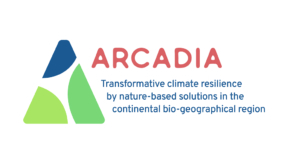ARCADIA is a project funded by HORIZON Europe Innovation Actions in response to the call “Testing and demonstrating transformative solutions on climate resilience, mainstreaming nature based solutions in the systemic transformation”.
The main goal of ARCADIA project is to mobilise 8 European regions and communities – from Italy, Croatia, Austria, Denmark, Sweden, Bulgaria, Romania and Slovenia – to accelerate nature-based solutions (NBS) adoption and assist them in accessing up-to-date, evidence-based actionable knowledge, guidance, knowledge-intense tools and services, mutual learning and networking opportunities.
General aims
ARCADIA project had the following general objectives:
- Co-design regional strategies to accelerate transformative adaptation, building upon and mainstreaming innovative, actionable NBS with demonstrated feasibility, effectiveness and social value;
- Assist and empower communities, public administrations and businesses;
- Stimulate collaborative knowledge building and transfer, developing capacities and capabilities;
- Promote coherence and exploit synergies, value and production chains, and public and private spheres of business innovation;
- Advance EU research and innovation agenda on NBS and EU Mission Adaptation.
CMCC role
CMCC will lead WP6 – Cross-regional support & synthesis. This WP aims at stimulating progresses and at fostering synergies across the model and the regions; it also aims at assisting in implementing co-innovation labs and at being a catalyst for large-scale, cross-border demonstration of climate resilience and connected blue-green infrastructures.
CMCC will also palay a key role in WP8 – Design and performance of nature-based solutions and infrastructures, and WP9 – Governance, policy and finance.
Activities
ARCADIA project is structured in 12 work packages (WP):
- Model region Emilia Romagna
- Model region Low Austria
- Model regions Zagreb and Krapina-Zagorje
- Model region Skane
- Model region Funen
- Cross-regional support & synthesis
- Values, attitudes and incentives for transformational change
- Design and performance of nature-based solutions and infrastructures
- Governance, policy and finance
- Mirroring the transformative processes in the fellow regions
- Dissemination, exploitation and communication
- Coordination and management
Expected results
ARCADIA project general objectives are translated into specific objective and tangible results:
SO1. Co-design regional strategies to accelerate transformative adaptation, building upon and mainstreaming innovative, actionable nature-based solutions with demonstrated feasibility, effectiveness and social value
– Five model regions and three fellow (replicating) regions will develop and adopt shared motivational visions for nature regeneration as a part of their climate resilience, adaptation and mitigation strategies and plans, within their jurisdictions, and across the key community systems most vulnerable to climate change;
– Fifteen demonstrators, co-developed with societal partners within the regional co-innovation labs, will analyse in depth the performance, acceptability and business readiness of most impactful, transformative nature-based solutions, and prepare their implementation, transfer, and large-scale deployment.
SO2. Assist and empower communities, public administrations and businesses – by building & improving access to shared knowledge, analytical tools, and best available guidance – to build capabilities to cope with climate risks
– Comprehensive catalogues of knowledge syntheses and operational tools to assess suitability and performance, design behavioural incentives, foster business sustainability, and monitor and evaluate progress made
– A suite of climate adaptation and resilience services and knowledge hubs forming a lasting legacy in the model and replicating regions
SO3. Stimulate collaborative knowledge building and transfer, developing capacities and capabilities – within, across and beyond the model and replicating regions
– Step-by-step guidance and coaching assistance to design and manage transformational resilience-building processes and pathways, scaling up innovations for greater impacts, and building resilience capabilities
– Three festivals of transformative nature-based solutions and green infrastructures, 15 inclusive innovation labsand experience centres, peer exchange program, and a series of datathons and citizen engagement events.
SO4. Promote coherence and capability building across adaptation policy domains, value and production chains, and public and private spheres of business innovation
– Catalogues of promising practices and experiences across communities and regions, shared community and consensus driven principles, values and standards boosting nature-based solutions
– Design and prototype regional common data spaces for climate adaptation, including data infrastructures and governance frameworks to facilitate data and knowledge pooling and sharing
SO5. Advance EU research & innovation agenda on nature-based solutions and the EU Horizon Europe Missions, particularly the EU Mission Adaptation to climate change.
– Contribute to mobilising European communities and regions for the EU Mission Adaptation to climate change
Partners
CMCC, Fondazione Centro Euro-Mediterraneo sui cambiamenti climatici (CMCC), Italy
Deda next (DEDA), Italy
Stichting Vu (VU), The Netherlands
Sveriges Lantbruksuniversitet (SLU), Sweden
Gecosistema (GECOS), Italy
Stichting Wageningen research (WR), The Netherlands
Climate-KIC holding (CKIC), The Netherlands
Regione Emilia Romagna (TER), Italy
Agenzia Regionale per la prevenzione, l’ambiente e l’energia dell’Emilia Romagna (ARPAE), Italy
Consorzio di bonifica di secondo grado per il canale emiliano romagnolo Canale Giandotti (CER), Italy
Ente parco nazionale dell’Appennino Tosco-Emiliano (PTE), Italy
Romagna Acque – società delle fonti spa (RASDF), Italy
Amt der Niederosterreichischen Landesregierung (LNOE), Austria
Niederosterreichische Agrarbezirkbehorde (ABB), Austria
Geosphere Austria (GSA), Austria
Niederosterreichische Energie-Undumweltagentur (NEU), Austria
Natur im Gartnen (NIG), Austria
Ecoplus Niederosterreichs Wirtschaftagentur (ECOPLUS), Austria
Regionalna energetsko-klimatska Agencija Sjeverozapadne Hrvatske (REGEA), Croatia
Sveuciliste u Zagrebu Agronomski Fakultet (UNIZG), Croatia
Grad Zagreb (ZAGREB), Croatia
GDI Drustvo s ogranicenom odgovornoscu za proizvodnju, Trgovinu i usluge (GDI), Croatia
Krapinsko-Zagorska Zupanija (KZZ), Croatia
Sustainable business hub Scandinavia (SBHUB), Sweden
Malmo Stad (MALMO), Sweden
Helsingborgs Kommun (HELSINKBORD), Sweden
Lunds Kommun (LUND), Sweden
Vandcenter SYD (VCS), Denmark
Odensee Kommunw (OM), Denmark
Syddansk Universitet (SDU), Denmark
Odensee Fjord Samarbejdet (OFD), Denmark
Agraren Universitet – Plovdiv (AUO), Bulgaria
Agentiua pentru dezvoltare regionala centru (ADRC), Romania
Znanstveno-Raziskovalno srediuce Bistra Ptuj (BISTRA), Slovenia
Alma Mater studiorum – Università di Bologna (UNIBO), Italy
Autorità di Bacino distrettuale del fiume Po (AdB-PO), Italy
Ente Parco Nazionale delle Foreste Casentinesi (PFC), Italy
Javna ustanova za upravljanje zasticenim dijelovima prirode Krapinsko-zagorske zupanije (JUKZZ), Croatia
Ministarstvo Gospodarstva I Odrzivog Razvoja (MinGOR), Croatia
Region Skane (SKANE LAN), Sweden


